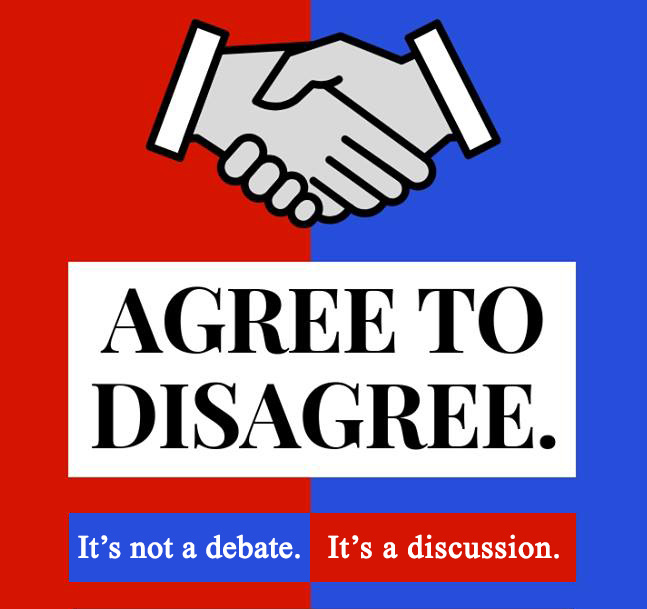Agree to Disagree: How to Respect Someone’s Opinion
Courtesy of Florida State University
Though we may all have different views and opinions, when we learn to accept each other for them, we can find peace over violence.
October 23, 2020
Respect is a word we have constantly heard throughout our lives and are often expected to follow. From when we were taught in our early preschool years to respect others’ opinions and feelings, to applying this as teens and adults when working among people of different diversities and beliefs, this word has always been used to avoid conflict with other people. Despite this, it is also a word that many at times aren’t willing to comply with. Controversy often consumes the minds of people, and they are so fixated on their point of view that they don’t see how someone else could express a different one. Because of this, friendships are being torn apart and strangers and becoming sworn enemies over some of the most divided topics currently affecting our nation, resulting in the destruction of buildings and lives. However, we should learn to embrace our differences, as it can open up our minds to new possibilities, and make us less closed-minded as many tend to become very controversial issues.
One way you can respect someone else’s opinion is by not letting your emotions override your ability to rationally think. On the news and even locally we have seen instances of arguments sparking as someone expresses their emotions in violent ways without thinking about the consequences. Though you may truly be passionate about a certain issue or belief, not everyone feels the same way, so it is best to never act shocked or angry when you come across someone with a different opinion. Instead, it is best to be calm about the situation and not debate the other person through an aggressive tone of voice and offensive words.
Communication is another key factor that can help us improve our respect for other people’s opinions. A lot of times we make assumptions about people before knowing why they truly have the opinion they do. Allowing time for them to explain can give you a chance to really see what they have to say through their own personal words and reasons, which can break the general stereotypes you may have associated with their opinion. However, you don’t have to agree with the person, but keeping your feelings mutual can help create a sense of unity between you and the other person.
When someone is communicating their opinion to you, make sure to listen attentively to what they have to say and use good body language to show that you are willing to hear what they have to say. Oftentimes without realizing it, we tend to tune out what a person says when we aren’t interested or don’t agree with them. However, when you practice your listening skills, it makes the person speaking more comfortable and not threatened by the potentially vulnerable state they are putting themselves in by explaining their opinion.
When stating your opinion and why you have it, be mindful that it is best to stay neutral to both sides and not convince the other person to be on the same side as you. This can be done by explaining your opinion through facts instead of your emotions and avoiding terms that are degrading to the other side, as this is what often causes arguing. Using words such as “I understand” instead of target words like “you” can help reduce tension between people, as you are not putting the blame on anyone in particular (psychreg). Especially don’t defend yourself by using words that attack the other side, such as saying that you feel people on their side are unproductive or biased. People can see your defense as a threat, as what we often feel when there is an opposition against us or our beliefs. This use of force and aggression drives people away while fueling a connection with people through not shaming them and instead of respecting them can make you a more understandable and likable person.
If you are still having trouble accepting their differences in opinion, it is best to look at the situation from their perspective and think about why they may believe in or support the things that they do. They may also feel similar to you in the respect that they may not be accepting of your opposing view. Looking into the situation through their eyes can help you find common ground with the other person, as you are both essentially human at the end of the day with an opinion. Therefore, your point of view on a certain topic shouldn’t affect how others treat you or how you live life.
However, despite using these tips mentioned above, if someone is being too aggressive towards you, it is best to just walk away from the situation or change the subject before things escalate into a much worse scenario. After all, there is no benefit in arguing with someone else, as your words could sabotage you in ways that can severely damage your future. The reverse effect could also happen from what you wanted as well, as you will also most likely get the person to not want to think like you, or worse, your actions may begin to be stereotyped with people that think like you.
A final way to accept other people’s opinions is to learn to love. No matter what the person says to you, thinking of the positive points they may bring up or noting how you actually may have learned something from them can definitely avoid conflict. It brings together both sides of a situation and proves that our world is truly not divided. After all, if things don’t go your way, learn to accept that is how the world works, and one day in your life there will be something that goes in your favor.
Practicing methods such as these are very important life skills, as we will most likely not encounter many people with very similar opinions to us. If we don’t make the person feel threatened, we can live in union through our differences. Ana Hopper (10) has found this an important skill in her life, saying “respecting other people’s opinions prevents unnecessary conflict with people and shows how we can still be connected no matter how we think.” This is a valid statement, as the more, we strive to see the connections we have with people over our differences, the closer we are to living in a world where hate and violence does not dominate all.







































Marin • Nov 18, 2021 at 4:26 PM
I have classmates and friends who have problems respecting the opinions of others and the part where it says friendships are being torn apart really stuck out to me because that’s exactly what’s happening
Sarah Lemos • Nov 4, 2020 at 9:40 PM
Love how you typed this article! Just what we needed now since it’s hard for people to take no as an answer. Awesome tips!!
Emma Perron • Oct 30, 2020 at 10:44 AM
Oh my gosh, I love this article. I love your idea for this article. The world needs to know how to respect peoples opinions. I like how you put tips and ideas to help. I love this article, great job!
Eunice Ahn • Oct 25, 2020 at 4:44 PM
I love the tips you have provided in this article. It is hard for many of us to respect others and for other people to respect us. Especially in such a judgmental world where you are viewed as an enemy if you have differing opinions or thoughts, it is always nice to just see someone pointing out to respect others. I think everyone should take a time to breathe and calmly go on with life.
Michael • Jun 8, 2022 at 6:27 PM
This article help a lot, thanks for sharing! And i think we need to consciously remind ourselves of respecting and recognizing the existence of different opinions, as denying one’s opinion means denying the reasonable existence of the opinion and the person, and that’s why we fill so upset and uncomfort when denied or rejected ,for our opinions comes from our past and our past is everything to us. And sadly, we can only make friends with person with the similar beliefs ,while respect&keep distence with the one with different beliefs who we have to work with. And you know that different beliefs can even break apart a family. So , the real thing is: the similarity naturally brings together the people with similar beliefs, and the respect is the only similarity between people with different beliefs to help them work together. And finally and luckily, we concluded that ,if you want to make connections with someone, you just need to find topics that both of you have the similar opinons about, and if you want to make enemies, just do the opposite.